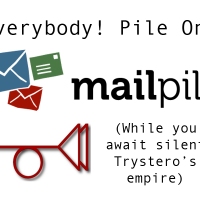The Used Book Store in the Cloud (probably isn’t heaven)
Do you “own” any of the albums, books, or movies that you have downloaded? You hit the “buy” button, didn’t you? Your bank statement provides you with evidence that you did indeed purchase a particular item, but do you own it? You may think that you own it, which is quite understandable, but from the point of view of the company you paid for the product , you may just be paying for a very long term loan.
After all, you can’t re-sell your e-books or mp3s when you’re done with them (not legally anyways). Part of the reason for this makes a sort of basic (if clunky) sense: what’s to keep you from simply selling a copy of the file while retaining the original for yourself? And won’t a single file be able to be resold nearly indefinitely as a re-sold e-book will not experience the same wear and tear that will eventually end the re-sell life of a paper book (better known as: a book).
This may be about to change, as was reported by David Streitfeld in his New York Times’ article “Revolution in Resale of Digital Books and Music” (March 7, 2013), though the title should likely either have the word “possible” in front or a “?” at the end.
Streitfeld’s article discusses upcoming initiatives by Amazon and Apple that will (if they survive the inevitable legal challenges) enable owners of digital content to re-sell those files when they are done with them.
The Apple system would allow:
“users to sell or give e-books, music, movies and software to each other by transferring files rather than reproducing them. Such a system would permit only one user to have a copy at any one time.”
While the Amazon system would create a system where:
“a book or movie or song [is] being kept in a customer’s personalized “data store.” When an item is no longer wanted, the user could sell or trade it to another user, an action that would automatically delete the item from the first user’s store.“
Both systems are still in development, and thus many questions remain, for example: would you only be able to re-sell digital items that you purchased through a particular store (could you re-sell iTunes songs in the Amazon marketplace)? Though one thing that is fairly certain is that Apple or Amazon would take a cut of the re-sale for their own coffers. And what should be made of the term “give” (in the Apple system) or “trade” (in the Amazon system)? Will these be seamless exchanges between individuals or costly switches mediated by a third party that will profit (and that will certainly track the change in ownership)?
Most of this system is built upon an already existing informational infrastructure: Apple already knows everything that you have downloaded through iTunes, and Amazon knows everything that you have downloaded through their systems. Having a “personal marketplace” of sorts where you advertise what you have that you may wish to re-sell or trade would only represent a change insofar as you were now making public information that had previously been kept for internal company use. The point: it is not as if this will mean that suddenly Apple and Amazon are tracking your download information, they are already doing that.
At the outset of the Times article Streitfeld addresses the ownership question, writing:
“you are in effect only renting an e-book — or an iTunes song — and your rights are severely limited. That has been the bedrock distinction between physical and electronic works since digital goods became widely available a decade ago.”
Though the article may suggest to the contrary, these potential digital used book stores do not actually change too much of that distinction. It is useful to think, in this case, of Apple and Amazon like video rental stores (remember those?): you pay to rent something (but for an indefinite period of time), you give it back (eventually), the store rents it to somebody else. After all, if your ownership relationship to your digital content were genuinely changing you would not need to go through Apple or Amazon to re-sell it.
Price will likely be a large component of this going forward, as will the question of whether or not publishers will get a re-sale cut. One of the reasons that a “used” book is cheaper is that it’s usually in less than pristine shape, but a “used” e-book is pretty much indistinguishable from a new e-book. This leads to some understandable concern from content creators and the companies who sell their work, who envision (not without reason) that this is another case of Apple and Amazon trying to wreck their competition (it seems to me that it is only a matter of time before Apple and Amazon put more attention into cutting out middle agents [like publishing companies] and work directly with content creators [this is already happening to a small extent]).
A solution to this is easy to envision in the form of digital files with built in deterioration dates, a digital file that can be transferred once or twice before it can be transferred no more (for example).
While it is no surprise that Apple and Amazon see this as a way to maximize profits just as it is no surprise that content creators and companies see it is as a threat, one particularly interesting aspect of Streitfeld’s article is that he briefly discusses this issue from a non-profit driven angle: libraries. Streitfeld writes:
“Libraries, though, welcome the possibility of loosened restrictions on digital material.“
Indeed, libraries have largely been on the losing side in the switch towards e-books. This is not because libraries are unwilling to embrace e-books – far from it – but because publishers have not been willing to embrace libraries. Many of the reasons that publishers have cited for their hesitance to give libraries access to their e-books are precisely the reasons that Amazon and Apple are batting at: the question of ownership of digital content, and the fact that digital content does not degrade.
Streitfeld quotes from Brandon Butler – The Association of Research Libraries director of public policy initiatives – and Butler’s sentiment is hardly unique to him. As American Library Association President Maureen Sullivan put it in “An Open Letter to America’s Publishers” (September 24, 2012) [bold italics in original]:
“Simon & Schuster, Macmillan, and Penguin have been denying access to their ebooks for our nation’s 112,000 libraries and roughly 169 million public library users…If our libraries’ digital bookshelves mirrored the New York Times fiction bestseller list, we would be missing half of our collection any given week due to these publishers’ policies.”
While Sullivan’s letter is from several months ago, the policies of these publishers have remained largely unchanged. Furthermore the publishers that do allow e-book sales to libraries frequently present a less than stellar deal: prices can be exorbitant, require re-purchasing after a certain number of uses (as is the case with Random House’s 26 circulation policy), or simply offer libraries a very limited selection of e-books (such as a publisher’s back catalog but not its current [and most popular] titles).
I imagine that the potential Amazon and Apple marketplaces will be caught up in court for quite a while, and I do not see this new model as representing something drastically different from what Apple and Amazon currently do (insofar as they already know everything that you have downloaded). Yet there is potential that positive legal space could be opened up by these new digital marketplaces that will make it easier for libraries to begin offering a full range of e-books, and will make it clearer whether or not you actually “own” your digital content.
True, it is unlikely that libraries will be able to get away with purchasing and then lending out second-hand e-books, but hopefully this could give libraries a boost in an area where they have consistently been on the, shall we say, not winning side. After all, it would seem slightly absurd for Amazon to allow you to “lend” your e-books to friends, but for libraries not to be allowed to do the same with many books.
All that being said, the swap-meet in the cloud is still a ways off, and it may be a tad naïve to think that a positive development in this sphere for Apple and Amazon would necessarily translate into a victory for libraries. I do not doubt that Apple and Amazon would love to be not only the main sellers of digital content but also the main sights for lending such content.
Yet, the sentences in Streitfeld’s second paragraph about the actual ownership of digital content will likely not change even should these market places be approved. In other words, you might be able to sell your unwanted e-books but you still will not own them.
And it is doubtful that Amazon and Apple are going to let you start owning them any time soon. If that was the case…you might not need them.










Pingback: More Copyright Ridiculousness | LibrarianShipwreck